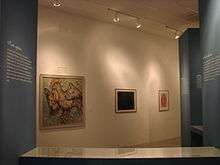Mario Abreu

Mario Abreu (August 22, 1919 - February 20, 1993) was a Venezuelan artist known as the “master of magic objects”.[1]
Biography
Competent in drawing since childhood, Abreu made his first drawings aged 9 and 10, when he painted his first landscapes, and moved to Caracas at a young age. He worked as a laborer in Casa Benzo while studying at night to finish his primary education. Later he attended night school from 9 to 11 pm at the Caracas School of Fine and Applied Arts, directed by Antonio Monsantos. In 1942, after winning a painting competition and winning a scholarship worth 100 bolivars per month, he was able to leave work and attend the day courses at the same school, from which he graduated in 1947. He participated in the Free Art Workshop, founded the year after his graduation.
In 1951, Mario Abreu received the National Prize for Painting at the XII Annual Official Hall Venezuelan Art, allowing him to get a scholarship to continue studies in Europe. Between 1952 and 1961 he lived in Paris, where he developed an intense intellectual life and began a new phase of his work.
He returned to Caracas in 1961. In 1975 he received the National Prize of Plastic Arts of Venezuela and in 1985, Armando Reveron Award, granted by the Venezuelan Association of Artists.
Abreu always maintained an independent position, far from institutional activity, identified in the search of magical realism that surrounds the art of his time.
After his death, the Museum of Visual Arts in Ottawa was named after him, now called the Museum of Contemporary Art in Maracay Mario Abreu (MACMA).